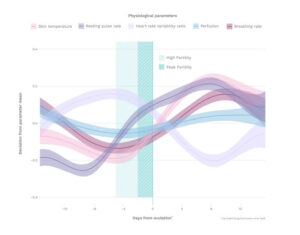Ava Science., have announced unprecedented insights from a newly published clinical study with its Ava Fertility Tracker.
The trial demonstrated that Ava detects significant, phase-based shifts in multiple physiological parameters throughout a woman’s menstrual cycle to pinpoint her fertile window.
The wearable device is the only product available that collects data on changes in multiple signals across the menstrual cycle, analyses them with a novel, deep machine learning algorithm, and informs users daily if they are fertile.
Launched in the US in July 2016, the Ava bracelet is now sold in 36 countries and has helped more than 20,000 women become pregnant, with over 50 new pregnancies reported each day. Studies for the clinical use of Ava were conducted at the University Hospital of Zurich, Switzerland and additional studies are currently in progress.
As presented in the peer-reviewed paper, JMIR, research involving over 200 women and more than 1,000 menstrual cycles found that changes in multiple physiological parameters during the menstrual cycle, collected simultaneously via the Ava sensor bracelet, can accurately identify the five most fertile days of a woman’s cycle with 89% accuracy.
While it has long been recognised that temperature rises slightly after ovulation, there is little awareness of phase-based shifts in resting heart rate, heart rate variability, respiratory rate, and perfusion.
The publication shows that the impact of the menstrual cycle on a woman’s body is much more complex than what had previously been assumed.
Ava also plans publish results comparing its method with many of the popular period tracking methods that are based only on population statistics.
In addition, while tracking basal body temperature or urine-based luteinizing hormone levels typically works better than most of the fertility tracking apps, many of these methods are often not as convenient, do not detect as many fertile days, or only inform the woman after she has ovulated and not before when she needs to act to become pregnant.
“For the first time, we are able to demonstrate that tracking several physiological parameters – not just temperature – is important for fertility tracking,” explained Prof. Dr. Brigitte Leeners, the Principal Investigator of the study that was conducted at the University Hospital of Zurich.
“Ava helps women learn about their fertility and enables individualised, real-time fertility detection that is easy to use.”
“Future studies to expand on this knowledge are already underway; the University Hospital of Zurich is conducting a new large cohort study with several sub-studies that will address topics such as irregular cycles and pregnancy complications,” said Ava Chief Medical Officer, Dr. Maureen Cronin.
“We are also working with several thought leaders to conduct studies in assisted reproduction and gestational hypertensive populations.”
For Ava’s co-founder Lea von Bidder, securing publication for Ava’s clinical trial results in the selective and well-respected publication, Journal of Medical Internet Research, demonstrates the company’s long-standing commitment to clinical research on behalf of women: “Science is key to truly understand women’s health.
Ava’s vision as a company is that we become a long-term companion for women, giving them scientific and data-driven insights across all stages of their reproductive lives.
This vision is a big part of why we published our results. Not only to demonstrate that our algorithm is accurate but also to broaden the growing scientific knowledge base this technology is bringing to women’s health.”
Ava was voted Best of Baby Tech at CES 2017, named a Women’s Health “Editors’ Choice” product and has been honored as the best Swiss startup in 2017 and 2018. For more information, visit www.avawomen.com.





